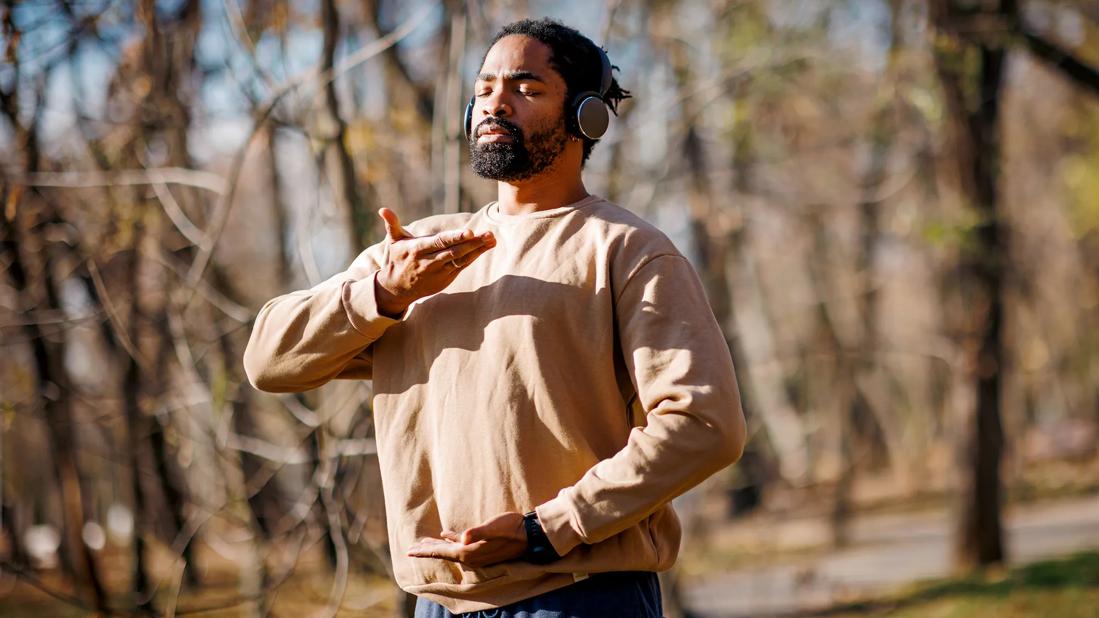This traditional Chinese medicine practice may boost mental health, immune function, balance and more

If you have 10 minutes a day, you have enough time to do qigong. This ancient Chinese practice is a popular way to calm your mind and energize your body that requires no special training or equipment. And — while it’s far from conclusive — some research suggests the practice is good for your health.
Advertisement
Cleveland Clinic is a non-profit academic medical center. Advertising on our site helps support our mission. We do not endorse non-Cleveland Clinic products or services. Policy
Integrative medicine specialist Yufang Lin, MD, explains what qigong is and how to add it into your wellness routine.
Qigong is a 4,000-year-old traditional Chinese medicine (TCM) practice that blends intentional movement, meditation and breathing practices. It’s based on the theoretical principle that we all have qi (pronounced “chi”), an energetic life force, flowing through our bodies. The belief is that qigong reduces stagnation of that energy, allowing the body to better heal itself. The literal translation of qigong is “to work with qi.”
“According to TCM, your qi must flow throughout your body for you to feel your best,” Dr. Lin explains. “If qi becomes blocked or stuck in a certain area, health problems can occur.”
Like most practices that have been around for thousands of years, there isn’t one way to do qigong. There are hundreds of different traditions, schools and approaches.
The most popular variant of qigong in the Western world is tai chi, which is commonly practiced in medical and wellness settings. Its focus on intentional movement, breath control and meditation has documented health benefits. Current science doesn’t support health claims associated with other, more spiritual forms of qigong.
Advertisement
According to Dr. Lin, small studies have shown that qigong provides a wide variety of health benefits. But that research also has limitations. Some problems, like small sample sizes, could be corrected by larger, more robust studies. Other issues — like the fact that there are hundreds of different types of qigong — are harder to address.
The existing evidence isn’t strong enough to support using qigong to treat or prevent health problems. But it does suggest qigong is safe to try and could be a helpful supportive therapy.
Here’s what the research says about qigong.
According to early studies, qigong may be a helpful complement to standard medical treatments for a wide range of conditions, including:
Sleep comes up in lots of studies about qigong and chronic illness. A 2024 review looked at those results. Despite the flaws in the studies they examined, the researchers found the “predominantly positive outcomes” interesting.
Their conclusion? While more, better studies are needed, the existing literature suggests qigong may help people dealing with sleep issues.
Like other types of intentional movement, qigong has been found to improve balance and gait, which reduces your risk of falling.
“As a child who grew up in Taiwan, I would see people practicing qigong in the park on my way to school,” Dr. Lin recalls. “Many were elderly. The slow, purposeful movements of qigong are less challenging to your balance. But they still enhance mobility, coordination and spatial awareness.”
A 2023 review of qigong studies found that the practice changes the hippocampus and prefrontal cortex of your brain in ways that may support memory, spatial awareness, focus and information processing.
If you’re considering taking a class, ask the instructor:
There is no licensing requirement for qigong instructors, but there are professional organizations, like the National Qigong Association, that offer certification programs. Those websites can be a great place to learn about courses in your area.
Advertisement
Not finding a group near you? That’s OK! While taking a class is helpful, Dr. Lin says it isn’t necessary. Many people learn qigong from free online videos.
“These movements are easy for most people to do, and you can modify them if you need to,” she explains. “Pay attention to the form and learn it properly first. Then, you can focus on breathing and being present.”
Dr. Lin’s other recommendation? Talk to your provider before starting qigong — or any other intentional movement practice, for that matter. Your healthcare team can help you figure out what safe participation looks like for you. You can even do chair-based qigong if you can’t stand.
The science on the health benefits of qigong is growing, although more studies are needed. And Dr. Lin is crystal clear: Qigong isn’t a substitute for medical treatment.
But she also points out that it’s popular for a reason: People enjoy it! And it makes them feel good! So, give it a try. If it makes you happy, that’s more than enough reason to keep it up.
Advertisement

Sign up for our Health Essentials emails for expert guidance on nutrition, fitness, sleep, skin care and more.
Learn more about our editorial process.
Advertisement

Different types of yoga poses, meditation and breathwork may help you feel more emotionally balanced

There’s very little scientific evidence that this alternative medicine practice works

Spoiler alert: Science doesn’t back the numerous health claims

This ancient form of exercise can offer a physical and mental boost

Many claims lack science-backed research, but halotherapy is popular and considered safe

This five-day exercise plan for beginners includes three days of resistance training, two days of cardio and two days of rest

If you don’t have an underlying condition, cold plunges might help ease sore muscles, decrease inflammation and even heighten your focus

This purple perennial has many uses, including sleep hygiene, reducing inflammation and pain, and elevating mood

Even small moments of time outdoors can help reduce stress, boost mood and restore a sense of calm

A correct prescription helps your eyes see clearly — but as natural changes occur, you may need stronger or different eyeglasses

Both are medical emergencies, but they are very distinct events with different causes